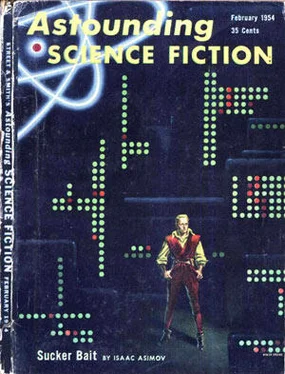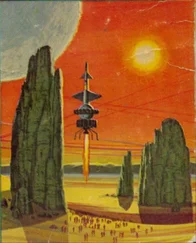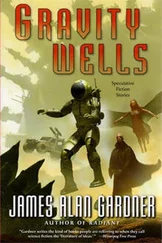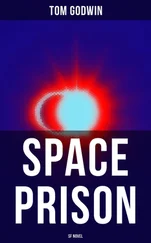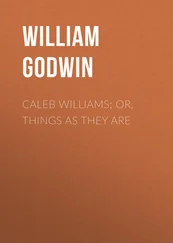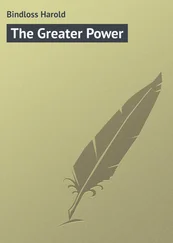Tom Godwin - The Greater Thing
Здесь есть возможность читать онлайн «Tom Godwin - The Greater Thing» весь текст электронной книги совершенно бесплатно (целиком полную версию без сокращений). В некоторых случаях можно слушать аудио, скачать через торрент в формате fb2 и присутствует краткое содержание. Год выпуска: 1954, Издательство: Street & Smith Publications, Inc., Жанр: Фантастика и фэнтези, на английском языке. Описание произведения, (предисловие) а так же отзывы посетителей доступны на портале библиотеки ЛибКат.
- Название:The Greater Thing
- Автор:
- Издательство:Street & Smith Publications, Inc.
- Жанр:
- Год:1954
- ISBN:нет данных
- Рейтинг книги:5 / 5. Голосов: 1
-
Избранное:Добавить в избранное
- Отзывы:
-
Ваша оценка:
- 100
- 1
- 2
- 3
- 4
- 5
The Greater Thing: краткое содержание, описание и аннотация
Предлагаем к чтению аннотацию, описание, краткое содержание или предисловие (зависит от того, что написал сам автор книги «The Greater Thing»). Если вы не нашли необходимую информацию о книге — напишите в комментариях, мы постараемся отыскать её.
The Greater Thing — читать онлайн бесплатно полную книгу (весь текст) целиком
Ниже представлен текст книги, разбитый по страницам. Система сохранения места последней прочитанной страницы, позволяет с удобством читать онлайн бесплатно книгу «The Greater Thing», без необходимости каждый раз заново искать на чём Вы остановились. Поставьте закладку, и сможете в любой момент перейти на страницу, на которой закончили чтение.
Интервал:
Закладка:
If he could know where they were and what lay beyond—but the street signs gave no clue. ELM 34—CENTRAL ROAD 265—NO LEFT TURNS.
They passed what had been a bank. An inclosure inside, with six steel-grated windows, faced the front. The street window was broken but one section, larger than the others, was lying on the walk. The dim gold lettering was still visible: GREEN CIT—FIR—NA-IO.
Green City. He remembered the name vaguely. Too far from the centers of population to be of any value to the State. One of the first cities bombed—center of atomic research work. He had seen a map of it once, at Underground headquarters. A topographic map which he had glanced at and laid aside.
As they walked on he tried to recall the features of the map. It had meant nothing to him at the time, but something about the map kept gnawing at the back of his mind. There was something the map had shown in the city—or was it beyond the city? The thing stirred deep in his memory and demanded to be recognized. It had not interested him at the time, but it was something of vital importance, now.
He tried to visualize the map. It had been white, with brown for the topographic lines and black for the roads. And blue—that was it— blue! A small river east of the city—at the very eastern edge of the city. A river, and freedom!
“Lorrine!” There was almost jubilance in his voice. “I know now where we are. There’s a river just beyond the city—it will take us away. We can use something for a raft, anything that will float. They can’t float down the river any faster than we can, and we’ll have a head start on them. And they’ll never know where we left the river.”
Some of the weariness left her at the words and she laughed, the moonlight bright on her upturned face. “Maybe I did try to cross a bridge too soon. I think a raft would be much better. Maybe this feeling I have is silly imagination, and we can laugh about it, tomorrow.”
The river was east of the city and they followed the street they were on. Its canyon stretched straight and clean before them, the moon shining down its length. The blocks fell behind them until it angled to the right and another took its place, the full moon still straight before them. There was a street sign at the junction and it read: RIVERSIDE DRIVE.
“Riverside Drive—it can’t be far, now,” he said. “It won’t be long until we can be on our way down the river and Harker and his little army will find the trail comes to a dead end at the river’s bank.”
“This will set him back, if we escape,” Lorrine observed. “It takes the capture of a lot of Undergrounders to win a promotion, but the loss of only two can set a Section Supervisor back to a one-stripe Squad Leader.”
“No, the State doesn’t let incompetence go unpunished,” he said. “But, to get to be Section Supervisor, Harker must have been an exceptionally thorough butcher up till now. I was never in his section before… do you know anything about him?”
Her answer was like a vicious, unexpected blow to the stomach.
“It seems he made a name for himself when he was in the Helicopter Scouts.”
He kept his face expressionless, not letting her see the effect of her words. The Helicopter Scouts—they were a roving patrol, unattached to any section. As a former Scout, Harker would have known of the river and conjectured that it would be their objective. While he and Lorrine wandered through the city and his memory lay dormant Harker would have planned, and carried out his plans. While they zigzagged through the city in their attempt to elude him he would have sent a detachment straight through to the river. There they would wait—or were waiting now—while the others came in behind, the bloodhound sniffing along the trail.
They were trapped.
But there was no need to tell Lorrine; perhaps he was wrong in his dark surmise, and perhaps Lorrine was wrong in her premonition. Perhaps.
They came to a corner where the show window was still intact, and the moon shone full on the dusty goods inside. Lorrine glanced briefly back the way they had come, as he stopped to scan it as thoroughly as possible in the moonlight, then she shaded I he glass with her hands and stared into the store.
“It was a toy shop,” she said, as they walked on. “It must have been just before Christmas; there was a star there—the Star of Bethlehem.”
A dusty tinsel star—peace on Earth and good will to all men. A pathetic little symbol, outlawed by the State, still shining dimly in a dead and silent city.
“It was a beautiful symbol,” she said, when he made no answer.
“Yes, it was.” He unconsciously accented the last word.
“It is, ” she said. “It will always be. People have followed that star for two thousand years—how many tyrants and States have died and been forgotten in that time?”
He did not answer, his eyes darting down the cross streets as they crossed another intersection. The city was brilliant with the moonlight, but for the inky shadows on the moonward side of the cross streets. It seemed to him he had never seen the moon so bright; it washed the street with bright silver and paled only a little the gold of Lorrine’s hair. It glinted along the barrel of his rifle and threw white lances of light from the fragments of glass on the walk. All was light and brilliance where they walked, but the river was straight ahead, and so was the moon. They could only walk on and chance the cross street shadows where, if anywhere short of the river, Harker’s men would be waiting for them.
When the interaction was behind them Lorrine spoke agam. “Were you an orphan?” she asked.
“My father died when I was three and my mother died a year later. Why do you ask?”
“I thought so—I’ve seen others who never had any families. Did you slay in an orphan’s home until after the war?”
“Yes.”
“And then, the State; put you in a Slate Home. How old were you, then?”
“Nine. I ran away when I was fifteen. Why do you ask?”
“Because I’ve seen others like you, with the same hardness. In the Homes they learn only discipline and dogma. They can’t know what the love of a mother is like, or even friendship. They either learn to obey, or they learn to hate.”
“Yes.” He smiled thinly. “It was there that I learned to hate them. When I was fifteen I knew what I wanted to do.”
“And what was that?” she asked.
“Destroy them—all of them.”
“You told me that, at first, you believed as I do,” she reminded him.
“So I did. When I ran away the Underground took me in and there was an old man there, old even then, who seemed to take a special interest in me. He believed as you do, and I believed as he did. He insisted that I read—all the, old books the State forbids, now. He was an idealist and I believed in his ideals in the years I knew him. He was an idealist and a dreamer, but he was a fine old man. The police got him the year I was twenty.”
“And you hated them all the more, then?”
“Of course. All his kindness and faith in the goodness of people meant nothing to the rat who identified him to the police. That was when I began to lose my own faith.”
“Then you’ve never had but one friend?” she asked. “If yon had had the chance to know the love of a family, to see the things people will do—the good things—for those they love the sacrifices they will make, you wouldn’t feel as you do.”
“Hate or idealism—the: goal is the same,” he said. “Destroy the State!”
“But it isn’t the same, to do something because you believe in it and to do it because you want to destroy something you hate.”
“The goal is the same,” he repeated. “And if, by some miracle, we should ever succeed, my satisfaction at the destruction of the State will be just as great as your joy at the freeing of your sheep.”
Читать дальшеИнтервал:
Закладка:
Похожие книги на «The Greater Thing»
Представляем Вашему вниманию похожие книги на «The Greater Thing» списком для выбора. Мы отобрали схожую по названию и смыслу литературу в надежде предоставить читателям больше вариантов отыскать новые, интересные, ещё непрочитанные произведения.
Обсуждение, отзывы о книге «The Greater Thing» и просто собственные мнения читателей. Оставьте ваши комментарии, напишите, что Вы думаете о произведении, его смысле или главных героях. Укажите что конкретно понравилось, а что нет, и почему Вы так считаете.
